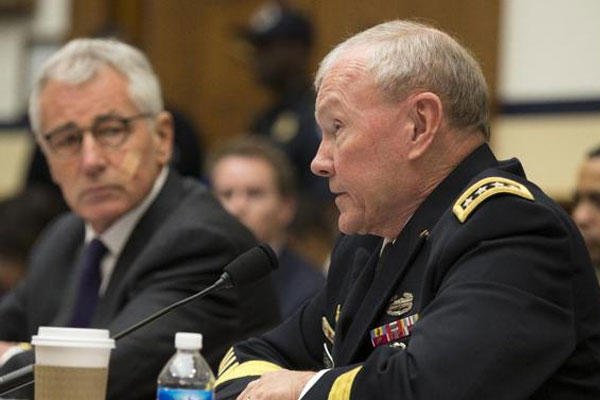Army Gen. Martin Dempsey renewed his assessment Thursday that U.S. "boots on the ground" might be needed to advise Iraqi national security forces on the front lines against the Islamic State of Iraq and Syria (ISIS), especially in a fight to retake Mosul.
"We're certainly considering it" at the Pentagon and at the U.S. Central Command, Dempsey said, while stressing that that he was not making a prediction on U.S. troops moving forward to give tactical guidance and call in airstrikes.
Dempsey reinforced the view he expressed in September in stating that he would not hesitate to recommend the use of U.S. ground forces to President Obama if he felt it was necessary in the overall campaign to "degrade and destroy" ISIS. Gen. Lloyd Austin III, head of CentCom made the same promise last week.
The military was currently working on the assumption that the combination of Iraqi and Kurdish peshmerga forces backed by U.S. warplanes would be sufficient to turn back ISIS, Dempsey said. But he would recommend U.S. troops at the front "if those assumptions were rendered invalid."
However, Dempsey reduced any expectations that the U.S. may deploy ground combat troops in Iraq soon.
"I just don't foresee a circumstance when it would be in our interest to take on this fight ourselves with a large military contingent," Dempsey said.
The entire effort was dependent on the new Baghdad government of President Haider al-Abadi healing the rift between Sunni and Shia communities, Dempsey said. If the Iraqis fail to come together against ISIS, "I will be among those recommending that we not support them," Dempsey said.
He made the remarks in testimony with Defense Secretary Chuck Hagel at a sometimes contentious hearing of the House Armed Services Committee on "The Administration's Strategy and Military Campaign" against ISIS.
Committee members from both sides of the aisle were deeply skeptical of the strategy and also cast doubt on the administration's push for Congressional approval of $5 billion in funding for the Defense Department to put 1,500 additional troops in Iraq.
Several committee members also questioned the administration's proposal for a new resolution on the Authorization for the Use of Military Force (AUMF) to deal with the ISIS threat.
The AUMF was enacted shortly after the Sept. 11, 2001 terrorist attacks to authorize action against Al Qaeda and was used to justify the invasions of Afghanistan and Iraq. "I hope we do not give the President a new AUMF," said Rep. Walter Jones, R-North Carolina.
The Committee's questions also focused on published reports that the administration's efforts to counter ISIS in Syria were in disarray over the conflicting demand to give priority to the overthrow of the regime of President Bashar al-Assad.
In Burma, where he was traveling with President Obama, Deputy National Security Advisor Ben Rhodes denied in a press briefing that the Syria strategy was being revamped.
"There's no formal strategy review of our Syria policy," Rhodes said, but the effort against ISIS in Syria "requires us to take a hard look at what we're doing on a regular basis."
Dempsey said that campaign against ISIS in Syria depended on vetting and training a "moderate" Free Syrian opposition force of about 5,400 fighters next year. However, an opposition force of about 15,000 would eventually be needed, Dempsey said.
At the HASC hearing, Committee Chairman Howard "Buck" McKeon, who will retire at the end of the session, accused the White House of carrying out a "minimalist strategy" against ISIS by ruling out a combat role for U.S. troops.
"Limiting our advisors to headquarters buildings will not help newly trained Iraqi and Syrian opposition forces hold terrain, much less defeat ISIL in the field," McKeon said, using another acronym for ISIS.
"Yet, the President has doubled down on his policy of ‘no boots on the ground' despite any advice you give him," McKeon told Hagel and Dempsey.
Hagel insisted that the current strategy was showing limited signs of progress three months after the U.S. and coalition partners began airstrikes against ISIS, but "we will succeed only with the strong support of Congress."
The advance by ISIS "in parts of Iraq has stalled, and in some cases been reversed, by Iraqi, Kurdish, and tribal forces supported by U.S. and coalition airstrikes," Hagel said.
More than 130 of the total of more than 800 airstrikes conducted since Aug. 8 have been by coalition partners, Hagel said. Last week, Canada carried out its first strikes, bringing the total of coalition nations involved in the air campaign to 12, Hagel said.
If approved by Congress, the 1,500 additional troops requested by DoD will bring the total U.S. troops presence in Iraq to about 3,100. Those troops will work out of Joint Operations Centers in Baghdad and Irbil, the Kurdish capital, and at four new training centers in northern, western and central Iraq, Hagel said.
Syria was on the strategic backburner for the Defense Department, Hagel said.
"In Syria, our actions against ISIL are focused on shaping the dynamic in Iraq, which remains the priority of our counter-ISIL strategy," Hagel said. "We are sober about the challenges we face as ISIL exploits the complicated, long-running Syrian conflict."
Hagel, who testified with a bandage on his left cheek from a bump with a kitchen cabinet door, also sought to assure the Committee that his postponement last week of a long-planned trip to Vietnam and Burma did not signal a reversal of the administration's commitment to rebalance U.S. forces to the Pacific region.
"I didn't want to have to do that," Hagel said of the postponement to allow him to prepare for hearings. "I will re-schedule. There's been no less emphasis on the importance of the rebalance."
-- Richard Sisk can be reached at richard.sisk@monster.com





























